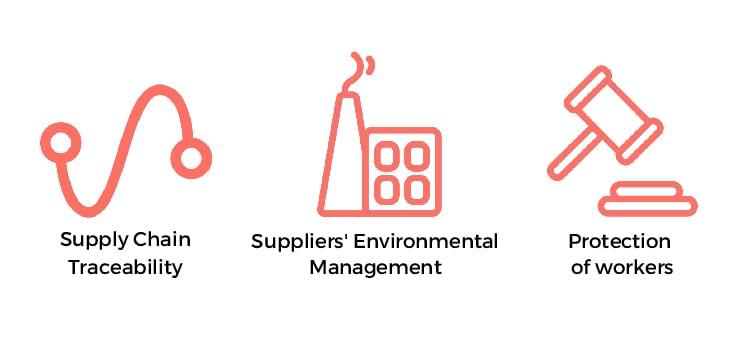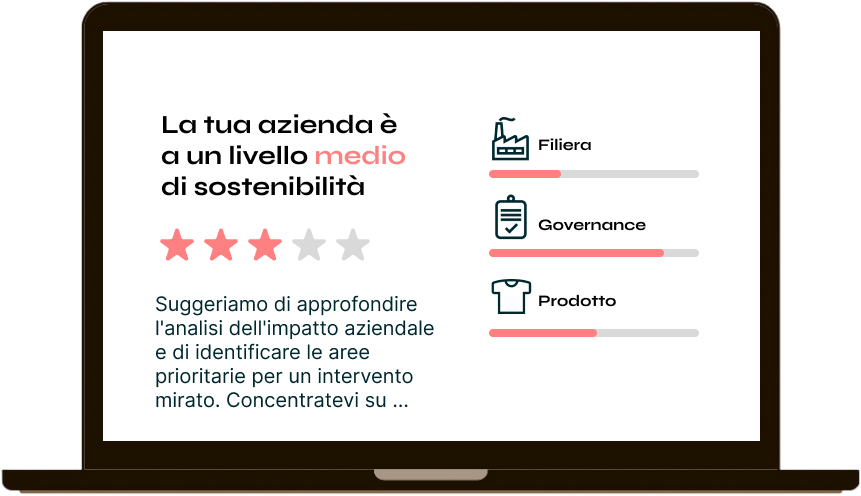Cikis Sustainability Assessment: Supply chain
The Cikis Sustainability Assessment: what is it?
Sustainable development is now a priority for fashion and textile companies, one of the most polluting sectors. The total emissions of greenhouse gases from textile production, equal to 1.2 billion a year, are higher than those of all international flights and maritime transport combined. This system must change. That requires systemic effort and an unprecedented degree of commitment, as well as collaboration and innovation.
In a previous article, we talked about Cikis Sustainability Assessment and how our framework developed specifically for the fashion sector allows us to analyze the integration of sustainability practices within business processes and the supply chain. A survey conducted by Cikis in 2020, showed that 41.5% of Italian SMEs do not have skills regarding sustainability. At once, 19.5% have never raised the problem.
The Cikis Sustainability Assessment is divided into three macro-categories. This framework maps the critical issues and strengths of the company as a whole, immediately identifying actionable points to be implemented in the strategy. In particular, for each area analyzed within the macro-categories, a benchmark is made comparing to the main industry standards.
Today we analyze the Supply chain macro-category. It indicates the level of sustainability of its suppliers and the level of traceability beyond direct suppliers. It holds key relevance in terms of both sustainability and attention on the part of the market: attention is paid increasingly to transparency on its suppliers and virtuosic practices adopted along the supply chain. By now, brand control must go beyond direct suppliers and embrace every stage of production, on pain of high reputational risks in the short, medium, and long term. This section consists of three areas:

Cikis Sustainability Assessment: Traceability of the supply chain
Tracing one’s supply chain beyond direct suppliers is one of the priorities defined by the Global Fashion Agenda. A fundamental part of the environmental and social risks occurs in the early stages of the supply chain; for this reason, becoming aware is the starting point for identifying opportunities for improvement.
The market requires more and more transparency: for example, the Fashion Transparency Index verifies that companies track not only direct suppliers but also subsequent ones, up to the growers of raw materials. According to international research by Fashion Revolution, 73% of consumers would like to know not only the manufacturing companies with which the brands work and also the suppliers of raw materials while 70% would like more information on the working conditions of the entire supply chain. Supplier scandals affect brands, which are in direct contact with end consumers. Not going beyond direct suppliers puts companies in front of reputational risk. Big brands, including Patagonia and H&M, respond with transparency initiatives on the supply chain, setting standards for the market.
Cikis Sustainability Assessment: Environmental management of suppliers
The environmental management of companies in the supply chain does not represent one of the main marketing levers of brands and is often not considered relevant in selecting materials and suppliers. However, these phases have a considerable environmental impact. In particular, the preparation of the yarn, together with cultivation and dyeing and finishing, represents the phase with the greatest environmental impact compared to the entire supply chain.
In identifying the sustainability targets of brands, little attention is given to suppliers‘ use of energy. However, it represents one of the major priorities in the sector as highlighted by Global Fashion Agenda. Science Based Targets also indicate the use of renewable energy and increasing efficiency along the supply chain as a priority, together with the selection of low-impact fabrics.
Cikis Sustainability Assessment: Protection of workers along the supply chain
The protection of workers and their rights is one of the most critical issues in the sector. The recent tragedies in the sector – such as the Rana Plaza‘s collapse – are often due not only and chiefly to the social management of direct suppliers but to that of subcontractors or suppliers further up the supply chain. Preliminary to the protection of workers is the tracing of the supply chain, which allows the identification of subcontractors and steps of the supply chain at risk.
The Cikis Sustainability Assessment: beyond the Supply chain
In addition to the Supply chain, our framework analyzes the Products and Processes and Corporate macro-categories. They are respectively linked to the level of sustainability of the collections and that of the corporate operations.
A complete and material analysis is the first step to define an effective sustainability strategy capable of integrating company priorities. In fact, in this phase, the main areas of action emerge, from which to start to outline the operational implementation project and an adequate communication strategy. Choosing Cikis means having practical support in selecting materials and suppliers, in the testing of chemical processes, in the development of circular economy projects, and in communicating the path taken.
Want to find out your company’s strengths and soft spots regarding the supply chain?
Get articles like this and the latest updates on sustainable fashion automatically!
